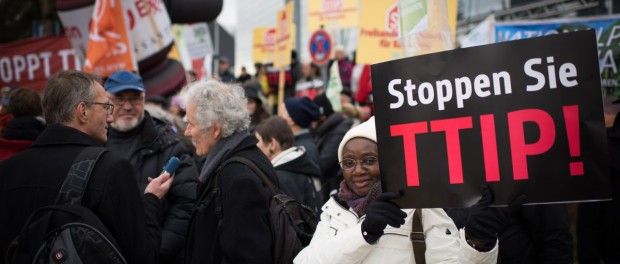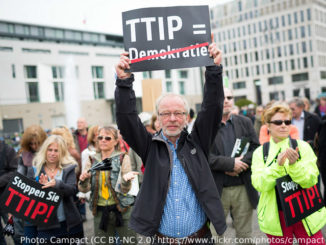
TTIP – the Transatlantic Trade and Investment Partnership – has been dealt a hammer blow by a vote yesterday in the US Senate on another similar trade agreement. TPP – the Trans Pacific Partnership – was curtailed as Democrats in the Senate voted against US president Obama’s plans to grant fast track authority for the legislation. The Trade Promotion Authority (TPA, or fast track) bill fell short of the 60-vote hurdle, failing 52-45. Had it passed, both trade agreements could have proceeded without amendments.
This has implications for TTIP because, as Karen Hansen Khun of Arc2020 sister organisation IATP told us twitter late last night “While most of the attention is on TPP, Fast Track applies to TTIP too! Includes a big focus on ISDS.”

This Senate vote then, places a serious hurdle in the way of TTIP. Fast track was to be used in both TPP and TTIP: its rejection seriously hinders the progress of TTIP.
According to Alexander Bolton writing in The Hill yesterday “The legislation faces even stronger opposition from Democrats in the House, and the surprise Senate failure could signal the beginning of the end for one of Obama’s top priorities.”
Likewise, the Guardian adds “it is seen as highly unlikely that international diplomats can complete either of the two giant trade deals currently in negotiation: the Trans-Pacific Partnership (TPP) and the Transatlantic Trade and Investment Partnership (TTIP).”
Obama had formed a bipartisan alliance with Republicans on the issue, but underestimated opposition within the Democrats, spurred on by powerful campaigning by labour unions and the NGO/CSO sector in the US.
TPP is the Pacific rim version of TTIP, covering eleven countries from Vietnam to Australia but excluding China, who are negotiating a separate deal expected to conclude in 20205.
But is the legislation scuppered or just stymied? According to the New York Times, the vote “presented Mr. Obama what might be a no-win situation. He may have to accept trade enforcement provisions he does not want in order to propel the trade legislation through the Senate, but those same provisions might doom the Pacific trade negotiations that legislation is supposed to lift.”
All told, both TPP and TTIP have been severely curtailed by this vote. Importantly this shows how politicians can be swayed on both TPP and TTIP: in the US, there had been consensus at an earlier stage in the finance Committee.
And as Doru Frantescu wrote in Euractiv, a similar process has happened in Europe too. Writing on the likely TTIP voting patterns in the European Parliament for the June Plenary: “the balance of power may still change before the end of the negotiations and the ratification by the EP, if the ‘against’ camp becomes more successful in convincing and mobilising the public opinion, exactly as it happened in the case of ACTA (who initially had the support of a narrow majority in the EP, but in the end the tide turned overwhelmingly against it).”
It seems more likely now, following this Senate vote on TPP, that MEPs will start to take far more seriously the undeniable civil society momentum to scupper TTIP.






1 Trackback / Pingback
Comments are closed.